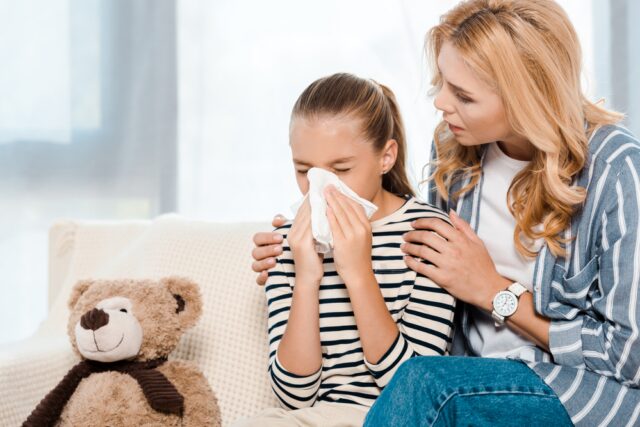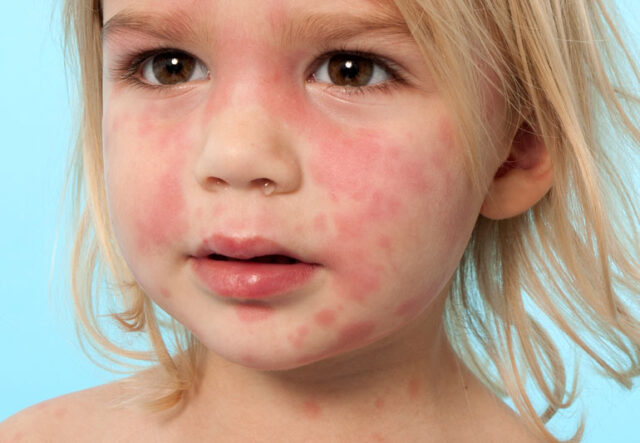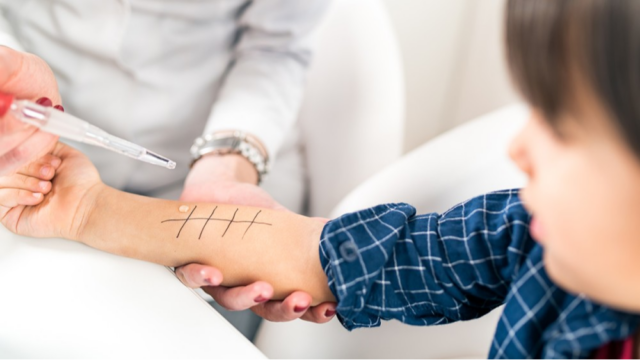
Having a baby with sensitive skin often leads to worrying about their safety and what might come their way, especially out in nature. Do they easily get irritated? Do you have allergies yourself? If this does apply and your child has allergies book yourself a paediatric allergy specialist! It’s the season of allergies and it is smart to act in advance and work toward preventing this from happening. Here is how you can know that your little one is ready for an appointment.
Signs That Your Child Should Go to a Paediatric Allergy Specialist:
1. They are sneezing
If something irritates or tickles your nose you should keep an eye out for it, especially if it irritates your child. All allergies will make you sneeze. The most common types are dust, pollen, and dander. This can also happen due to the body’s way of dispelling germs. Watch out for constant sneezing, especially if it always happens in the same location (outdoors), and tell the doctor about it.
2. Stuffy nose

One of the most common signs of allergies in children is a runny or stuffy nose. Ironically enough, both of these can be a sign of allergies. Your kid will experience this as the air passage becomes narrow, making their nose constantly stuffed, blocked, or itchy. For some, this can create pain or discomfort. A stuffy nose will act up and become mostly inflamed during the springtime.
3. Tight throat
If you ever see your child holding his or her throat or not being able to swallow food properly visit a doctor. Their throat could be tightening within seconds or minutes, making their breathing unbearable. This reaction most often happens when one is eating foods that they are allergic to. Your body and your immune system will release chemicals to fight an allergy, making tightness in the throat an obvious symptom.
4. Watery eyes
Eyes that are red, inflamed, or watery could also suggest that you’re having an allergy, or that your little one is. If their eyes are always itching when exposed to a certain substance tell that to the doctor. In most cases, this happens because of mites, and smoke exposure, but it can vary from person to person.
5. Skin rash

Itchy skin is almost always present. If you spot bright red and small patches with tiny bubbles chances are that these bumps are due to irritation or infection. If your little one is wearing something uncomfy or that he or she dislikes in terms of fabric, the immune system will attack it. Redness and skin rash can be painful and unbearable for little kids, as well as super itchy and irritating.
6. Coughing
According to Offspring Health, Your kid will have a coughing reaction due to their immune system to an allergen. It is often followed-up with asthma, a serious cough that you can’t miss out on as it happens. If your kid feels pain or tightness in the chest while gasping for air it is probably from an asthma cough. This symptom can be painful, which is why making a doctor’s appointment should be your first go-to step.
7. An upset stomach
An upset stomach happens due to food allergies and digestive problems. If your kid eats something that is too heavy or incompatible with their stomach they will have abdominal pain, vomiting, or even nausea and diarrhea. Watch out for any changes in behavior, especially when eating or giving them some new food items.
What are the different types of allergies?

You and your kid can be allergic to a lot of different things, not all of them are connected. The most common allergies are:
Food allergies: once specific food is consumed our stomachs will react in 1-2 hours. Some infants may also have allergic reactions to lactose that do not show right away. These can be anything, such as milk, fish, eggs, shellfish, nuts, berries, etc.
Skin allergies: watch out for eczema or hives. Your kid can develop a rash and an allergy all throughout his or her body. Common places are the tongue, arm, eyelids, and lips. This can happen due to external factors, fabrics of some sort, etc.
Allergic rhinitis: commonly known as hay fever. With this one, symptoms can show in a matter of hours. Followed up with a ton of sneezing, this allergy happens mostly due to dust mites, pollen, spores, or even animal skin, urine, and saliva.
Asthma: this happens as your lung’s airways become swollen and tight. It is a respiratory inflammation that happens due to irritation by a specific fragrance, smoke, dust, etc.
Pay close attentional during the period of seasonal allergies
Seasonal allergies are very common. In fact, did you know that about 40% of children in the U.S. suffer from allergic rhinitis?! Your kid will most likely show symptoms during the springtime, so keep an eye out during that period. It is up to you to react and be proactive as a parent since any type of both small or big allergies can have an effect on your child’s day-to-day activities.
How will the appointment look like and where to find a paediatric allergy specialist?

What to expect when you take your child to an allergist for the first time?
Well, the paediatric allergy specialist will take a close look into your medical history. Did you know that they can diagnose 80% of allergic problems just by speaking to the family and looking into their history, or by taking a look at the rash? After that, the doctor will check your kid’s eyes and nose, and listen to your child’s lungs. In the end, they will do a skin prick test or a blood test on your child.
If you want the best service, followed by a lot of care and professionalism, make sure to find the best doctor. Therefore, it is critical to know pediatric allergy specialists like ApricusHealth that you can trust. Give them a click and see for yourself.







